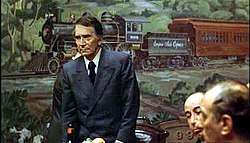Emilio Barzini
Emilio "The Wolf" Barzini is a fictional character and the main antagonist in Mario Puzo's 1969 novel The Godfather and in its 1972 film adaptation, in which he is portrayed by Richard Conte.[1][2] The Barzini crime family was inspired by the Genovese crime family.[3]
| Emilio Barzini | |
|---|---|
 Richard Conte portraying Emilio Barzini | |
| First appearance | The Godfather |
| Last appearance | The Godfather: The Game |
| Created by | Mario Puzo |
| Portrayed by | Richard Conte |
| In-universe information | |
| Nickname | The Wolf |
| Gender | Male |
| Title | Don |
| Occupation | Crime boss |
| Family | Barzini family |
| Children | Emilio Barzini, Jr. |
| Relatives | Emilio Barzini, Jr. (mentioned) |
In the novel
Barzini heads one of New York's Five Families, and is the second most powerful Mafia don in the country after Vito Corleone. His criminal interests are in narcotics, gambling, and prostitution, and he is looking to expand his empire to Las Vegas and Nevada.
Barzini first appears as a guest at Connie Corleone's wedding. Soon after, Barzini arranges for drug lord Virgil "The Turk" Sollozzo to meet Don Vito with an offer to enter the narcotics trade, openly backed by the Tattaglia Family. During the meeting, Sonny expresses interest in the deal, though Vito refuses the offer. Barzini attempts to assassinate Vito in hopes that Sonny, as his father's successor, will accept the deal. When Sonny refuses to enter the heroin trade as long as his father is alive, Barzini secretly conspires with the other families to wage war against the Corleones, forcing them to make peace and open up their territory to drug trafficking. To this end, he approaches Corleone's son-in-law, Carlo Rizzi, with a ploy to draw Sonny into an assassination. After Sonny's death, Don Corleone agrees to lend his political protection to the enterprise and honor the peace accord. It had initially appeared that Philip Tattaglia was leading the anti-Corleone alliance. However, at the peace summit, Vito realizes that Barzini was the mastermind behind it.
Not satisfied with the Corleones' submission, Barzini begins chipping away at their territory in New York City. At Don Corleone's funeral, Barzini approaches Corleone caporegime Salvatore Tessio to organize another peace summit where Corleone's successor, Michael, would be ambushed. Barzini doesn't know, however, that he has walked into a trap. Before he died, the elder Corleone had explicitly warned Michael that his enemies would attempt to kill him in exactly this manner, at a supposed peace meeting, with whoever in his own Family who approached him with the proposal revealed as a traitor. Michael has been planning for some time to eliminate Barzini and the other dons, and deliberately allowed Barzini to move in on the Corleone interests in order to lull him into complacency. Shortly thereafter, Barzini is assassinated along with the other conspirators. Corleone enforcer Al Neri, disguised as a police officer, lies in wait for Barzini outside of the New York Supreme Court courthouse at Foley Square, on the pretext of writing a parking ticket for Barzini's car. When Barzini emerges from the building, Neri kills Barzini with two shots in the back and his body tumbles down the courthouse's marble steps.
Influences
Emilio Barzini is based on the real life mobsters Vito Genovese, Frank Costello and Lucky Luciano, all bosses of the Genovese crime family.
In other media
In Francis Ford Coppola's film adaptation of The Godfather, Barzini is portrayed by Richard Conte. Conte was previously considered for the role of Don Corleone, but lost to Marlon Brando.
In The Godfather: The Game, Barzini has protagonist Aldo Trapani's father killed, motivating him to take revenge. In the game, Trapani kills Don Barzini on the court steps.
References
- "The Godfather (1972)". nytimes.com. Retrieved 2014-06-24.
- Ebert, Roger (January 1, 1972). "The Godfather". Chicago Sun-Times. Chicago, Illinois: Sun-Times Media Group. Retrieved July 7, 2014 – via rogerebert.com.
- Sanders, Brent (February 10, 2014). "10 Real-Life Inspirations For Characters In The Godfather". ListVerse. Retrieved May 25, 2015.